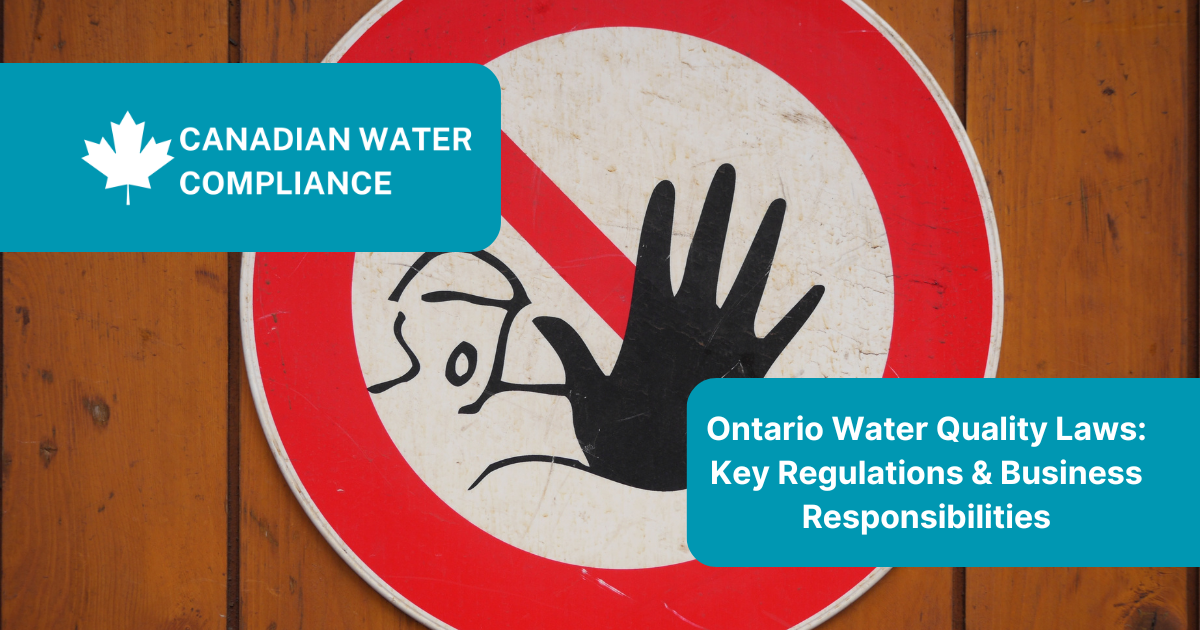
Written By: Canadian Water Compliance | On
Water quality is strictly regulated in Ontario to ensure safe drinking water, protect the environment, and prevent outbreaks of waterborne diseases. Businesses, property managers, and industries must comply with provincial and municipal regulations—or face legal and financial consequences.
In this guide, we’ll break down the most important water quality laws in Ontario, highlight municipal-specific rules, and explain the risks of non-compliance.
Ontario has a robust legal framework to protect water safety. The most critical laws and regulations include:
The Safe Drinking Water Act (SDWA), 2002 is the cornerstone of drinking water safety in Ontario. It establishes the legal responsibility for water system operators to provide safe drinking water and sets out licensing requirements, water testing mandates, and penalties for violations.
🔹 Key Requirements:
✔ Water providers must conduct regular testing for bacteria, lead, and other contaminants.
✔ All test results must be reported to the Ministry of the Environment, Conservation and Parks (MECP).
✔ Owners/operators of water systems must be licensed and have accredited training.
🔹 Penalties for Non-Compliance:
❌ Individuals: Up to $4 million in fines and/or imprisonment for up to 5 years.
❌ Corporations: Up to $10 million per day for ongoing violations.
✅ Example: In 2018, the City of Walkerton was fined $250,000 for failing to meet water safety reporting requirements, following a history of non-compliance dating back to its deadly E. coli outbreak in 2000.
The Ontario Water Resources Act (OWRA), 1990 governs water use, wastewater discharge, and pollution control. It applies to businesses that use large amounts of water or discharge effluents into natural waterways.
🔹 Key Requirements:
✔ Permits required for businesses withdrawing over 50,000 liters/day from surface or groundwater.
✔ Strict effluent limits on industrial wastewater discharge.
✔ Prohibits direct contamination of Ontario’s lakes, rivers, and groundwater.
🔹 Penalties for Non-Compliance:
❌ Up to $6 million per day for first-time corporate offenders.
❌ Fines increase for repeat offenses, plus possible criminal charges.
✅ Example: In 2021, a Hamilton steel company was fined $2.5 million for illegally discharging toxic chemicals into Hamilton Harbour, violating OWRA pollution standards.
The Clean Water Act (CWA), 2006 focuses on protecting municipal drinking water sources from contamination. It mandates source water protection plans and risk assessments for businesses operating near water sources.
🔹 Key Requirements:
✔ Businesses in designated Wellhead Protection Areas (WHPA) must follow strict pollutant control measures.
✔ Industries handling hazardous materials must develop emergency response plans.
✔ Property owners near vulnerable water sources must comply with site-specific risk reduction policies.
🔹 Penalties for Non-Compliance:
❌ Maximum fines of $100,000 per day for businesses failing to comply with protection plans.
✅ Example: In 2019, an agricultural operation in Simcoe County was fined $75,000 for failing to control manure runoff into a nearby municipal well’s protection zone.
Several Ontario municipalities have additional water quality regulations beyond provincial laws. Here are some of the most notable city-specific rules:
🔹 Toronto:
✔ The Toronto Sewer By-law (Municipal Code Chapter 681) restricts industrial discharges into city wastewater systems.
✔ Businesses must conduct regular testing of effluents and provide compliance reports.
✔ Heavy fines apply for exceeding allowable pollutant limits.
🔹 Ottawa:
✔ Water Quality Management By-law requires landlords to test for lead in tap water in older buildings.
✔ Strict compliance rules for businesses operating near the Rideau River.
🔹 Hamilton:
✔ Additional controls on industrial discharge into Hamilton Harbour due to past pollution concerns.
✔ Mandatory Legionella testing for large cooling towers under public health guidelines.
Businesses that fail to comply with water regulations risk severe financial and legal consequences, but proactive water testing can prevent violations and ensure compliance.
✔ Legionella Testing – Prevents outbreaks in cooling towers and HVAC systems.
✔ Bacterial & Chemical Testing – Ensures safe drinking water for employees and customers.
✔ Effluent Testing – Confirms compliance with municipal discharge limits.
📢 Don’t wait until a fine or an outbreak occurs! Regular water testing is the best way to stay compliant and protect your business.
📞 Need expert water testing in Ontario? Contact Canadian Water Compliance today to schedule a professional assessment.